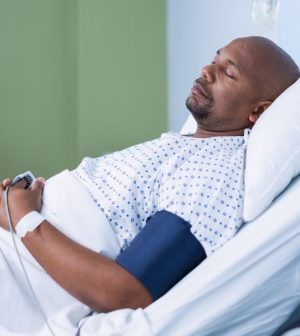- Could Your Grocery Store Meat Be Causing Recurring UTIs?
- Are You Making This Expensive Thermostat Error This Winter?
- Recognizing the Signs of Hypothyroidism
- 10 Strategies to Overcome Insomnia
- Could Artificial Sweeteners Be Aging the Brain Faster?
- Techniques for Soothing Your Nervous System
- Does the Water in Your House Smell Funny? Here’s Why
- Can a Daily Dose of Apple Cider Vinegar Actually Aid Weight Loss?
- 6 Health Beverages That Can Actually Spike Your Blood Sugar
- Treatment Options for Social Anxiety Disorder
Disrupted Sleep Plagues Hospital Patients, But New Program Might Help

Anyone who has cared for a hospitalized loved one knows that frequent nighttime sleep interruptions — caused by noise or nursing checks — are a big concern.
But in a new study, a Chicago hospital adopted sleep-friendly measures for patients that led to fewer nighttime awakenings without compromising care.
Nighttime room entries dropped by 44 percent after researchers educated doctors and nurses on the health consequences of in-hospital sleep deprivation. The researchers also tweaked the hospital’s electronic health records system to avoid unnecessary overnight disruptions.
Over a year, patients in the so-called SIESTA unit also experienced an average of four times fewer disruptions for medication dosing and three times fewer for routine vital signs.
“We’ve known [inpatient sleep deprivation] is a problem since Florence Nightingale in the 1800s, so why hasn’t it been fixed? It’s a very patient-centered problem that also has health implications,” said study author Dr. Vineet Arora. She’s a professor of medicine at University of Chicago.
Arora’s prior research showed that even short amounts of sleep loss among hospital patients were associated with higher blood pressure and higher blood sugar levels during hospitalization. Other research has focused on delirium in sleep-deprived patients, as well as hospital readmission rates, she said.
A prior survey of Medicare patients also showed that only 62 percent reported their room was kept quiet at night, Arora noted.
The new study was conducted on two 18-room general medicine units. About 1,100 patients were admitted to either a standard unit or a SIESTA-enhanced unit. In the SIESTA (Sleep for Inpatients: Empowering Staff to Act) unit, clinicians were coached on improving patient sleep, while those in the standard unit were not.
The SIESTA program also used “nudges” through patients’ electronic health records to have staff skip unnecessary nighttime vital signs checks or medication doses.
While sleep-friendly orders rose in both inpatient units, the SIESTA unit logged more significant changes. Decisions to forgo unnecessary vital signs checks every four hours rose from 4 percent to 34 percent. Meanwhile, sleep-friendly timing of nighttime medications such as anti-clotting drugs jumped from 15 percent to 42 percent.
Dr. Seun Ross is director of nursing practice and work environment at the American Nurses Association. She said, “I believe all hospitals and clinicians err on the side of caution when choosing to assess their patients during specific intervals at night.” Ross was familiar with but wasn’t involved in the new research.
“Based on clinical judgment and a conversation with the patient, nighttime disruptions can be decreased,” Ross added. “This initiative is practical for patients that qualify — meaning they are clinically stable and not in critical condition. Sleep is healing, which is important for every human, but in an inpatient setting, communication is paramount.”
Arora and Ross agreed that many hospital nurses would be open to suggestions or a formal program that minimizes patients’ sleep disruptions.
“I actually view nurses as natural partners to improve patients’ sleep,” Arora said, noting that the American Academy of Nursing recommends nurses reduce unnecessary overnight care.
But, “while sleep is considered in the domain of nursing, it’s important to have doctors and nurses on the same page. It’s absolutely a team effort,” she added.
“I hope patients in the future, when they go to the hospital, are guaranteed their sleep will be considered as part of their recovery,” Arora said.
The study is in the January issue of the Journal of Hospital Medicine.
More information
The Palo Alto Medical Foundation offers more on the effects of sleep deprivation.
Source: HealthDay
Copyright © 2026 HealthDay. All rights reserved.










